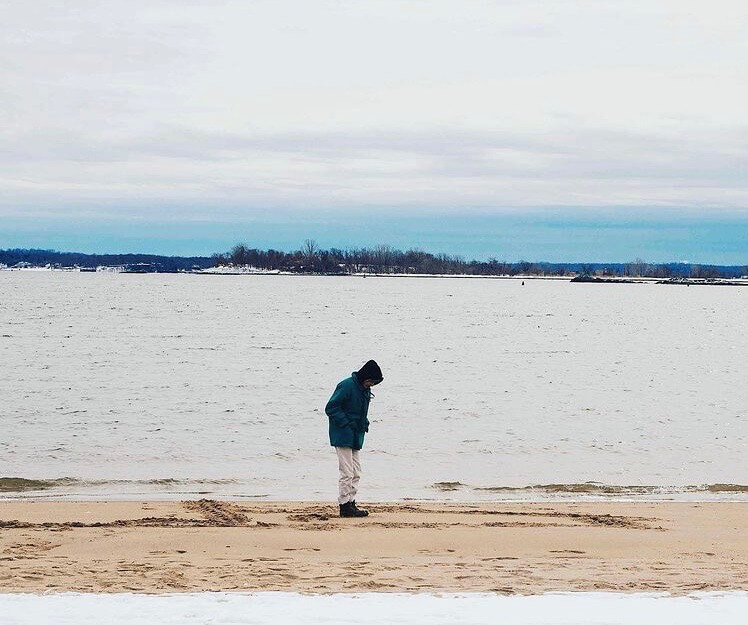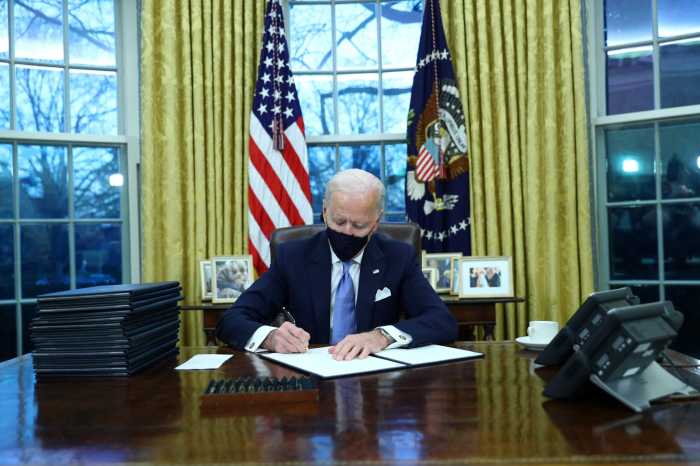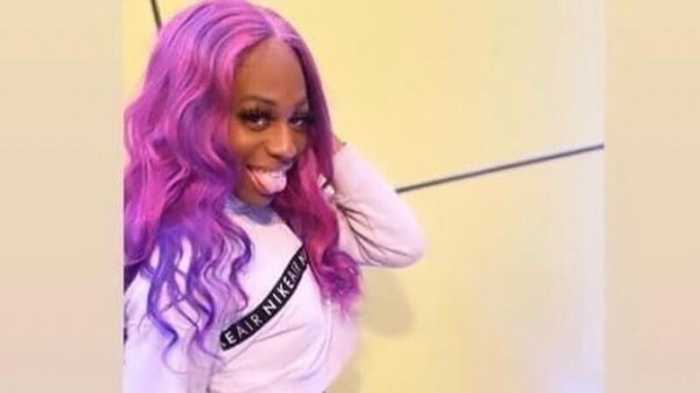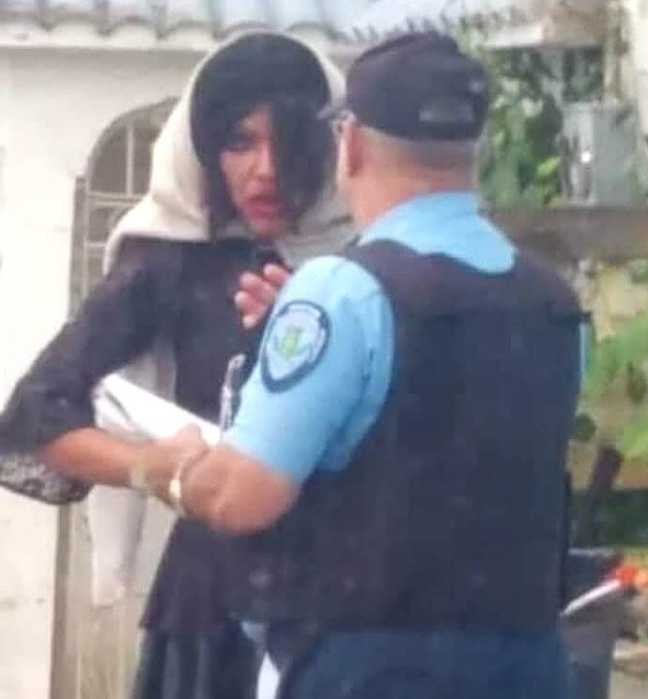Twenty-four years ago, Pedal Miranda was born into a uniquely turbulent American family, assigned female at birth, and given the name Gabrielle. Today, Pedal uses third-person pronouns and identifies as transgender and non-binary. A poet, artist, and prison abolitionist, they work for Release Aging People in Prison/RAPP, striving to envision a new world of “collective liberation,” where a carceral system is unthinkable.
Older generations (not unlike mine) habitually envision collective liberation as homogeneous, exulting masses cheering universal freedoms newly won by some top-down revolution. But Pedal believes that collective liberation starts within each self, then works its way out — something much harder to picture than happy, liberated multitudes. Maybe, at this stage, we shouldn’t even try. Instead, listen to Pedal.
The below portion features Miranda’s responses during a wide-ranging interview with Gay City News about their upbringing, identity, family, and more.
What Makes a Person
My dad and mom couldn’t decide on a name for me the first week I was alive, but one of my dad’s names for me was Pebbles, because he thought I looked like Pebbles Flintstone. That’s where I got Pedal.
I grew up socialized as a girl. My mom is a poet and a literature professor, and my dad is super-smart, self-taught. He grew up in an orphanage in Cincinnati, ran away from home at 15. My dad is white; my mom is Puerto Rican. Most people think I’m part Asian, so the idea of passing for me has been a big theme.
I was born into a radicalizing context. Shit was always chaotic in my house. My parents and my brother fought often — there was a decent amount of domestic abuse. We moved so much and my dad did not always have a job. My mom provided for all of us. Puerto Rico is a colony; my mom was always very loud about that, which has its own particular constructions of race and identity. I think all these identity factors politicized me.
But we also spent a lot of time reading together and talking. When I was 11, my mom put a copy of “Our Bodies Ourselves” on my bed. That’s how I learned what masturbation was. She schooled me on a lot of the things that people with vaginas face, in ways that were kind of traumatizing because I was so young.
As far as being socialized as a girl, I didn’t experience body dysphoria. I wore pink all day, I wore a dress. I was into princesses. But I was very competitive. In school, I would pick the smartest boy in my classes; that’s who I had to beat. I was often the only “girl” who would speak in class. I guess what I’m saying is — I’ve always felt gender queer. I’m also a switch. Like, I’m both a bottom and a top in sex, and my first sexual encounter was with a girl.
Sometimes people think I’m someone with a penis. In public I’ve been gendered as a man. So, all this stuff about what makes a person always felt in the forefront of my mind.
I’ve had a number of different partners — some cis men, some cis women, some trans women, some non-binary people — and I feel a difference being intimate with people of different gender identities. I feel like a different “they.”
They-They-They-They
I decided to start using they/them pronouns one night, out with my friend when I was in college. The college had jazz nights on Thursdays, with live musicians, the little club thing. We were dancing, and it just entered my brain: the beat of the music was “they-they-they-they.” I was so happy.
There was a fountain in front of the main building, and afterwards, I put my head in there to baptize myself with the new pronouns. I then laid down in the roots of this tree in front of the library. This moment of coming into who I am and feeling happy about it, with the pronouns, was really good.
I say I’m trans, but trans as a marker is still related to this idea of what you’re assigned at birth. Being assigned anything at birth is part of the tools of oppression. I also identify as queer. And when I date cis men, I tell them, “You’re queer. I’m not a cis woman — you’re attracted to someone who isn’t a woman. So you’re queer.”
So I’m trans but cis-passing, which is a weird concept. I’m not going for looking like a man or a girl. That’s a different experience from someone who is identifying as a woman but was assigned male at birth.
I’ve had people misgender me on purpose — people I’ve dated and people I’ve worked for — and most of them have been cis, het, white men who are just angry that I’m myself. They’re people who, I can tell, have a basic disrespect for me being the author of my own identity.
I say I’m not a woman, but the truth is, in moments when I’ve needed to fight back or be strong or defend myself, I’ve embodied what it means to be a woman. What I fall back on is a woman-self. But I’m gender fluid. I think I also could say I’m gender-queer but my identification is not really grounded in one gender, it’s multiple.
In the Taíno culture, there’s Two-Spirit, a kind of sacred identity. I went to a Taíno Two-Spirit meet-up a couple of years ago; there were little kids introducing themselves with different pronouns. But I don’t think I can say I’m Two-Spirit — I’m not able to connect to my Taíno ancestry without co-opting that Indigenous identity.
My queer family, if I have one, is two trans girls who are dating. I relate to them as my moms; they call me their son. They take care of me, especially this past summer. We got arrested together, protesting the police after the murder of George Floyd. We were handled very aggressively and held in a precinct in the Bronx.
One of my moms got put into a boy’s cell, and I was on the other side with these girls. I remember there was a trans woman in my cell, though I wondered where I would place myself in terms of the girls’ and the boys’ cells. In that moment, I thought, What if I’m the wall?
This is about the destruction of prisons and policing, and the creation of new ways of relating to each other. So if I’m the wall, then I have to turn myself into a window, to make those divisions not exist. I have to be a portal, not a solid structure, because where I place myself in the binary is the dividing line itself. In order to do away with this binary culture, do I have to destroy myself — or is my existence a window?
Trans and Non-Binary People Are Living Acts of Resistance
I grew up with some relatively close connections to people in prison. My brother spent time in jail. I never liked the police. I didn’t like when they were called on my family. Yeah, neighbors not liking us, domestic abuse, random shit. I had bad feelings about the police. All of that, in some way, contributed to who I am.
I’m so grateful I found this prison reading group where I was exposed to the abolitionist framework: building a new world, getting rid of policing. But lately I’ve been thinking I want to use the term abolition less, because it’s lost its specificity. I was reading the mission statement of Critical Resistance (a national organization dedicated to ending “prison-industrial complex”) with one of my friends. Unlike most people I know, she was like, “That’s scary, we don’t know what they mean by ‘the world they want to see.'”
Different people have different visions… Honestly, I think it’s a kind of privilege to assume we’re all on the same page. To tie it back to my trans identity, in order to understand our path to collective liberation, you have to start from the self and work outward. I don’t think that looks the same for every single person.
Self-care and self-knowledge are revolutionary. I think trans and non-binary people are living acts of resistance. But any person, even a straight, cis, white guy – maybe he has a disability; maybe he’s poor – has been harmed somehow. I think there’s much more to gain from considering how we treat ourselves, as a form of resistance, than creating a hierarchy of oppression.
Here’s a tiny anecdote. Someone I know is a cis man. He’s bisexual or gay; he works for a vaginal health company that makes homeopathy things. When I’m at the OB-GYN, I certainly experience dysphoria, but talking to him about medical issues of my vagina felt much better than talking to a woman. It’s the fact that I’m attracted to men but also identify as a boy. I don’t know if readers of Gay City News would be offended, but I do sometimes identify, believe it or not, as a gay man.
What would I tell people to do when they meet someone new? It’s complicated; an individual, case-by-case situation. But it’s also simple. It comes down to respect. Respect for someone’s right to define who they are. That outweighs making someone uncomfortable about identity as opposed to prioritizing your own assumptions over someone else’s assertion of who they are.
In terms of protocol, I think the best thing when people are being introduced is to give pronouns in addition to your name. Don’t assume, “You’re transgender, so I know your pronouns,” because someone could use they/them pronouns but not want to be identified as trans.
Thankfully, I have a community where I feel affirmed most of the time. Given my privilege as a mostly white-passing, mixed person with a U.S. citizenship, I don’t really need to be pushing an agenda. But I do owe it to my trans community to raise consciousness around what being trans can mean.
At the end of the day, I’m just one person and sometimes I think I get a little too mystified with my own story. It’s not really the cross I want to die on. But I also have grown to love telling people who I am. It’s fun. I just get nervous about containing it in something that makes sense – because I don’t think the way the world works makes sense. This is about being able to tell the truth – which is limited by existing frameworks and language.
Basically, how we consider and relate to ourselves and “the other” is up for a change.
To sign up for the Gay City News email newsletter, visit gaycitynews.com/newsletter.




































